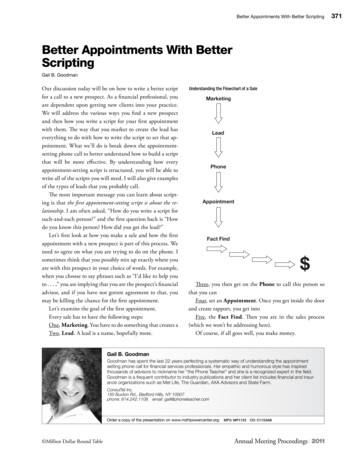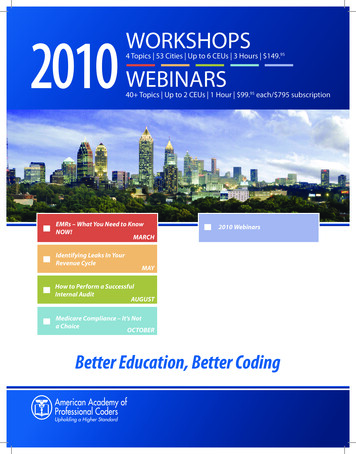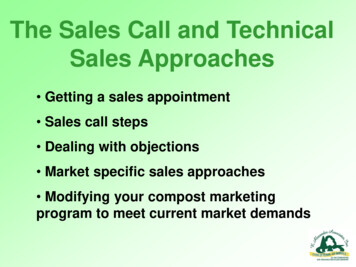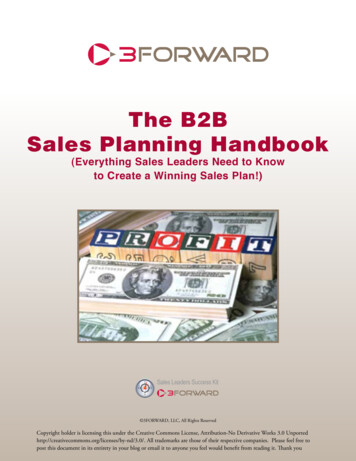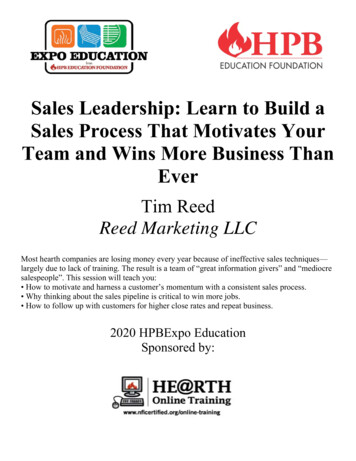
Transcription
Sales Tips and Strategiesto Increase Your Sales SuccessA Blue Beetle Books Publication
Copyright 2011 Blue Beetle BooksSales Tips and Strategiesto Increase Your Sales SuccessVaughan, Ingrid; Business WriterDolinsky, Karla; EditorPublished as an eBook original byBlue Beetle Books.No part of this eBook may be reproduced inany manner whatsoever without the writtenpermission of Blue Beetle Books.Blue Beetle BooksPO Box 8120, Victoria, BC, V8W 3R8Tel: 250.920.6923E: info@bluebeetlebooks.comwww.bluebeetlebooks.com
Sales Tips and Strategiesto Increase Your Sales SuccessTable of ContentsIntroduction .4Successful Sales Habits .5Seven Deadly Sales Sins .6Sales Lessons from Driver Training .8Rising From the Slump: 5 Ways to Improve Your Sales Success .10What’s in a Word? All Communication Channels Impact the Selling Process .1210 Surefire Ways to Lose the Sale! .14Organize Your Way to Better Sales .1525 Everyday Ways to Increase Sales .17Surviving the Loss - Recovering from Losing a Big Customer .18Applying the “7 Habits” to Your Sales Strategy .20The Things We Do That Lose Us Sales .22Successful Speaking Successful Selling.24Community Futures East Central3
IntroductionWe’re all busy people, which is why the Small Business SuccessLibrary of books is a great way to get your hands on a lot of informationvital to your success, in easy bite-sized pieces. I don’t know aboutyou, but I love lists, they seem to make sense to me and I can take onboard some of the points and disregard others without having to wadethrough a bunch of stuff I already know.In Volume One of our Sales series you will find over 50 tips and habitsspanning fast-paced articles that will help you avoid the pitfalls ofselling in today’s increasingly competitive markets.We start with successful habits – everyone knows that good habitslead to success. However, we also need to acknowledge that there arethings we do that may in fact lose us sales. You’ll find several articleswith mistakes to avoid, those things that we all somehow pick up along the way as our sales careersprogress. Things we probably don’t even realize we’re doing until someone brings it to our attention, orour closing rate starts to drop.We use the analogy of driver training to bring your attention to how to successfully “drive” your salessuccess and discuss the habits we should be nurturing, the ones that will result in increased sales.These are often things we know we should be doing, but perhaps no longer pay enough attention toin our everyday sales life. A refresher course is always helpful. And what about that unavoidable salesslump that every sales professional has experienced at some time in their career? We’ve got some tipson how to climb out of the dumps and get back to productivity when you’re feeling the slump.Thought about getting yourself more organized? Organize Your Way to Better Sales will give you toolsto ensure your lack of organization isn’t losing you sales. Finally, learn some lessons from successfulpublic speakers on how to improve your sales presentations.Whether you are a small business entrepreneur new to sales, or a long-in-the-tooth sales professional,you’ll find something in this eBook to make you think about how you are approaching prospects,making presentations and closing (or not closing) sales.Sales Tips and Strategies to Increase Your Sales Success is a quick and easy read, but the advice inthese articles has the power to increase your sales significantly, if you start adopting them today!Ingrid VaughanBusiness WriterCommunity Futures East Central4
Successful Sales Habitsehavioural specialists tell us it takes 21 daysof consistently using a new behaviour for it tobecome a habit. Here are some sales habitsyou could try that could increase your closingrate significantly.blame on others for it. Fess up if you’ve made a mistake,promise to make it right, and then follow through.BAsk and you shall receiveAsk for the sale. Be aware of the different socialstyles of the people you are selling to and use thatknowledge to ask for a sale. Many a salespersonhas walked away from people who were willing tobuy, but were never asked.Sell only to those who want to buyBecome a quick discerner of people who reallywant to buy from you, and people who just aren’tinterested. Spend more time on the people whowant what you’re selling, and less time trying toconvince people who don’t, that they do.Speak well of your competitorsThis shows integrity. People who are willing totrash talk their competitors might be just as willingto do so about their customers. They are seen asuntrustworthy. There is always something kindyou can say.Know your product inside and outThere should be no question about your productor service you cannot answer to your customer’ssatisfaction. Knowledge inspires confidence, and ifyour buyer has confidence in you, your sales pitchwill be more effective.Don’t fake itSome people will do anything to avoid losing asale, including making promises about thingsthey really can’t do and then scrambling to tryto get it done. Focus on what you dowell, and if you get questions aboutsomething that is beyond yourexpertise or specialty, referthem to someone whocan do a good job forthem. Doing thisguarantees theywill come back toyou the next timethey need your service.Ask for referralsWithout being pushy, determine never to let asales opportunity go by without asking yourprospect or customer if they know anyone elsewho might be interested in what you have to sell.Follow up and do what yousay you’re going to doCredibility is key for a salesperson. If you sayyou will follow up and don’t, if you promisesomething and don’t deliver you can’t recapturethat credibility. Not only will you lose it with thiscustomer, but with every one he or she talks toabout you.Practice these new habitsand watch your salesincrease.Take responsibility for thingsthat go wrongNothing frustrates people more thansomeone who denies responsibility forsomething that is their fault, or who castsCommunity Futures East Central5
Seven Deadly Sales SinsWe all make mistakes, but some mistakes aremore costly than others. In the area of sales, in asmall business, a mistake can mean the differencebetween meeting your cash flow requirementsfor that month, or not. It can mean the differencebetween gaining a new, loyal customer who willbring cash into your business for years to come, orlosing that potential income source. Here’s a list ofseven mistakes to avoid when making sales.Selling Without Knowing YourCustomerCustomers want to buy from someone who isnot only knowledgeable about the product theyare selling, but also about the industry in general,and about their needs specifically. Would you sellthe same way to a young one-income family withfour kids struggling to make ends meet as youwould to a two-income couple with professionaljobs and large disposable incomes? If you takethe time to listen to your customers and askappropriate questions, they will tell you what youneed to know. Knowing your industry is important.Knowing your product is essential. Knowing yourcustomer is paramount to making sales.Avoiding Dissatisfied CustomersIf you avoid the people who aren’t happy withyou, you’re losing the opportunity to build loyaltyin those customers. Look at dissatisfaction asyour opportunity to go above and beyond. Doeverything you can do to make it right with thosecustomers and you’ll encourage loyalty that willstay with you for years.might purchase in the future. You also don’t knowhow many people that person can refer to you ifthey are treated well, or how many people they willsteer away from you if they aren’t.Ignoring Small OrdersEvery customer is an important customer. It maybe tempting not to bother with orders that aresmall or on which you won’t make much of aprofit, but you never know what that customerCommunity Futures East CentralUsing the Same Old PitchComing back to the same customers with thesame old pitch is a big mistake. People want to6
know you are innovative, creative, and on thecutting edge of your industry. Make sure thatyou revitalize your sales presentation often. Usedifferent examples, different approaches, appealto different behavioural styles and offer differentincentives. Being creative is one of the keys tomaking sales.Going for the Popular Vote Ratherthan the Respect VoteAlways show integrity in your dealings with otherpeople. It may feel good to put your competitiondown so you can convince your prospects of howmuch better you are, but in the long run it won’tbenefit you. People may like you in the moment,especially if you have charisma and the power ofpersuasion, but once you walk away they’ll thinkabout the things you said – both about yourselfand about others – and they won’t trust you.Integrity always wins in the end. A tip for dealingwith competitors without trashing them is to studytheir strengths and weaknesses. Then, promoteyour strengths as they relate to the weaknessesof your competition. In this way you expose theirweaknesses and demonstrate why you are better,all without mentioning them once.Not Taking Advantage ofSales TrainingYou may think you’re the best salesperson on yourteam (and in fact you may be), but the best salespeople never stop learning new ways to improve.Take advantage of every sales training opportunityyou can find. You will never lose if you choose tokeep on learning. Even if you don’t hear anythingnew from the instructor, you can learn from theexperiences of others in the room, or be a resourceto others who aren’t as experienced as you are.Make lifelong learning part of your sales strategy.Avoid these seven sales mistakes and incorporatethese principles into your sales approach, andyou’ll not only increase your sales, but also findthat your customers will notice and appreciateyour business integrity.Being a CheapskateEverything you do makes an impression on yourcustomer. Are you willing to take a client to lunchevery few months to let him know you appreciatehis business? Do you pick up the tab if you’vemet for coffee with a prospect?Do you acknowledgeothers who give youfree advice or referralsby sending a note or agift? These may be smallthings but they make abig impression.Community Futures East Central7
Sales Lessons from Driver Training1. Keep your eyes on the roadWhen you’re a brand new driver, you are soterrified that your eyes are glued to the road, butonce you’ve been at it for a few months, youtend to loosen up a bit and start noticing all thedistracting things around you. It’s probablysimilar to when you had your first salesposition. Every meeting with a newprospect was terrifying and you keptyour focus on the task ahead ofyou. But once you had a fewsales under your belt, you mayhave started becoming distracted– losing your focus just a littlebit. If you’ve been driving your sales career for along time, you’re especially prone to distractions,laziness, or worse: bad habits. Remember thatsuccessful sales people are highly focused andkeep their eyes on the goals ahead of them, leavingdistractions by the side of the road.f you’ve ever been in the position of helping yourson or daughter obtain their driver’s licence, you’llknow about the painstaking hours it takes toteach good habits (and unlearn bad ones). You’llknow the feeling of taking your life in your handsevery time you get in the car with a learning driverbehind the wheel. You’ll understand the thousandthings you do so automatically when you’ve beendriving for many years that you now have to try toremember in order to teach them. In fact, many ofus who have been driving for a long time may havea hard time passing a driver’s test. These lessonsmake a great metaphor for driving a successfulsales campaign. Metaphors work really well to helpus remember things that may not stick. Perhapsthis one will work to help you remember some keyelements of successful sales strategies.Community Futures East Central2. Be aware of what’s in yourperipheral visionWhen you’re first learning to drive, it’s difficult to beaware of those dangerous things beyond the roaddirectly in front of you. Learning how to do thatis called defensive driving, and it’s an importantdriving skill that may keep you from harm down theroad – but it takes practice. (Note that being awareof what’s in your peripheral vision is different frombeing distracted by things that have nothing to dowith your driving!) It doesn’t come naturally. Whileyou’re staying focused on your sales goals, youdo need to be aware of what’s in your peripheralvision. What are your competitors doing that maynegatively impact your sales process if you don’tsee it? What is going on in your industry that will8
involved so that people get to know you, and howmight that turn into sales down the road?have a significant impact on customers’ buyingdecisions? Where is your company going in termsof its vision and goals, and how might that impactyour plans? Staying focused is important, but so isknowing what’s going on around you. If you driveyour sales campaign defensively, you may avoid bigmistakes or other disasters that jump out in front ofyou while you weren’t paying attention.4. Don’t speedBoy, this is a tough one. Most of us who havebeen driving for a while, if we’re honest, will saywe struggle with staying within the speed limits.And yet, those limits are there for our safety.When accidents occur, they are often a result ofpeople going too fast to make good decisions.This can happen with sales as well. Rushing intoa presentation without being properly prepared;going ahead with a campaign before you have allthe information; trying to force a sale on someonewho’s just not ready to make a decision. We’veall done it at one time or another, but we’ve alsoprobably learned that rushing into things increasesour chances of making mistakes. Taking things instride and moving at a pace that is forward-thinkingyet cautious is probably the best balance.3. Pay attention to the signsIn order to get a learner’s license, a new drivermust first pass a written test about road safetythat includes knowing what all the signs mean. Thesigns are there to keep you from danger, to pointyou in the right direction, to warn you of what’sahead, and to keep others on the road safe aswell. What are the signs you need to know for yourbusiness? Pay attention to what’s going on in yourindustry, and indeed, in the national and globaleconomy. By being a savvy trendwatcher, you maybe able to predict certain consumer behavioursthat can put you ahead of your competition whenit comes to making those sales. Watch for signsabout what’s going on in your local community. Isthere a big event coming to town? How might yoube able to turn that into a sales victory? Is yourdowntown being revitalized? How could you getCommunity Futures East CentralIf you’ve found yourself in a bit of a rut lately withyour sales progress, see if you’ve developed somebad “driving” habits and get back to basics. Youmight be surprised what comes from that process,and as a result find yourself sailing through yournext sales test!9
Rising From the Slump: 5 Waysto Improve Your Sales Successbut be determined not to wallow in them. Thesooner you can start taking positive action – evenif those actions don’t provide instant success – thesooner you’ll move toward getting back on yourfeet and conquering sales again. Here’s someadvice to keep you on track when you’re demotivated and discouraged.Have you ever found yourself in a sales slump?Where the thought of getting up and hitting thestreets again for one more day is almost more thanyou can bear? When it feels like the last time youheard a “yes” was months ago and your paycheckhas been bearing witness to that fact? Whenyour motivation is low and your energy practicallynon-existent? Take heart. Everyone who has everworked in sales has gone through a slump or twoin their career, including sales professionals whoare leaders in their industry. Slumps are normal,but how you deal with those “slumpy” feelingsdetermines whether they will make or break yoursales career. Recognize those feelings as normal,Community Futures East CentralKeep prospecting current andcontinuousOne of the greatest temptations for salesprofessionals is to stop prospecting once theybuild up a healthy client list. Those who thinkprospecting is for beginners lose their edge pretty10
the benefit of your product or service, and revealhow easy it is for them to solve their problem withyour product.quickly. If you continue to keep your prospectingcurrent and continuous, when a slump sets inyou automatically have a “hit list” ready to go.Prospecting regularly helps you to stay current withwhat’s happening in the market, whose business isclosing, who’s starting a new business, what newfranchises are coming to town, and who advertiseswhere. Keep your prospect list up to date and it willhelp you pull yourself up when you feel like you’rehitting brick walls.Work on building relationships ratherthan rapportSomeone once told me that rapport is about gettingpeople to like you, building relationships is aboutgetting them to trust you. While initially, rapport isimportant to make people feel comfortable withyou, you will never build customer loyalty if youstay in that mode. Get to know your customers– what they like, what they want, what they do intheir spare time, where they spend their money –because it’s in that process of building relationshipsthat those ‘aha’ moments come to you. Suddenlyyou see how a need connects to a customer’sinterest and you can find a pragmatic way to meetthat need. It takes a bit of risk to venture intorelationships, but the payoff is big.Qualify your potential buyersMany sales people spend way too much time tryingto sell to people who aren’t qualified to buy fromthem. This is a waste of your time, and learning toquickly qualify your buyers will move you towardsuccess faster than you can imagine. If Mr. Smith isa really nice guy and will gladly and politely listen toyour sales proposals but does not have the budgetto purchase what you’re selling, you’re wasting hisand your time. If the Johnson’s just took out a hugemortgage on a new house and have been clearthat their discretionary dollars will be tied up for awhile, it won’t matter that they’ve spent a lot withyou before – right now they’re not qualified to buy.This doesn’t mean that you should stop maintainingrelationships with people who can’t buy from youright this minute, but you may be wasting a lot ofenergy trying to sell to people who cannot buy, nomatter how much they may like to, or how muchthey like you!Customize your sales proposals –one size doesn’t fit allA mistake that many sales professionals make isthinking that once they’ve hammered out a decentsales proposal, they’re done and can hit thestreets with it. They feel it doesn’t matter if they’retalking to a local shoe store or a national truckingcompany – the facts are the facts. Nothing couldbe further from the truth. The facts may be thesame, but all customers are not. Taking the timeto customize proposals for individual prospectsor customers makes a big impression. Addingtheir logo to the cover of your presentation, usingstatistics and information on their industry right inyour proposal, identifying needs that are unique tothem and proposing a way to meet those needs– all work toward your credibility. Your knowledgeand desire to truly meet their needs will movethem toward the buy.Move from convincing to revealingA big mistake many sales people make is thinkingit’s their job to convince or talk their clients intobuying what they’re selling. Nothing could befurther from the truth. Convincing usually endsup in desperate attempts at manipulation, whichdeter most customers from buying. It’s normalto feel a little desperate when your sales havebeen slumping, but ask yourself whether you’vebeen spending more time lately trying to convincepeople to buy from you. Your job as a sales personis to reveal to the buyers what their needs are, andhow you can meet those needs. Revealing makesyour customers much more receptive to what youhave to say. Reveal their problem or need, revealCommunity Futures East CentralIf you need a boost in your sales success, try thesefive strategies and see whether they help you getback in the saddle again, and closing those salesat record rates! One success leads to another – soget back on track quickly and you’ll find yourselfnaturally getting into the groove again.11
What’s in a Word?All Communication Channels Impact the Selling Processanyway. Yet someone else could walk in and saythose same words only to irritate their customer.On the other side, there are sales people whosewords are kind and empathetic, but ultimatelythey lose the sale because their tone and postureare unconsciously combative and antagonistic, orworse, unsure or apathetic.Often, we are unaware of the subconsciousmessages that we give to others around us.Truthful communication requires consistency inthe words we use, the tone of our speech, andthe body language that we use to communicate.Simply put, what you DO often speaks louder thanwhat you SAY!! According to experts who studycommunication, only 7% of the meaning of themessage is carried in the words we say. A further38% is your tone of voice, and 55% is your bodylanguage. How does that information affect thesales process? Have you ever met a salespersonwho it appeared could get away with saying almostanything? Even though their words may haveseemed offensive, their clients seem to love themCommunity Futures East CentralWhat might this look like when you’re sitting infront of a customer? Take this example. You’vedone your presentation, given all the information,answered all the questions, and are in the processof closing the sale. You may have memorized apatient response for moving the customer throughthose final objections, but if your cadence is too12
3 or 4 questions) questionnaire that they can leavewith you. Ask them questions like – Did you feelyou were listened to and that your needs wereimportant? Did you feel any undue pressure topurchase, and if so, what specifically made youfeel pressured? Do you feel you received enoughinformation to make a purchasing decision? Doyou feel we were interested in what your needswere and in finding the right product for you? Isthere anything we could have done differentlyin our sales presentation? Simple questions likethis will give you some great information and helpyou determine whether something is going wrongduring your sales visits.quick, or you’re leaning too far forward, or yourtone indicates a slight boredom, your customerwon’t feel your belief in your own words. Hemay even perceive your communication ascontradictory, annoying or insincere – and thatmakes for a sure sales failure.The trouble is, most of us can’t really be objectiveabout our own way of communicating and how wecome across to others. We need feedback to makesure we aren’t using a tone that indicates boredom,that our body language isn’t intimidating, or theopposite – insecure. Most of us have the wordsdown pat – it’s the other 93% we need to work on!Here are some ideas to get a handle on how you’redoing in the whole process of communication.If you’ve found yourself in a slump in the salesdepartment – this might be the key.Ask your competitors or your suppliers whatthey have heard about you. This one is tough –because you may not like what you hear. Granted,you’d have to have a pretty good relationshipwith these folks and have built trust and integritywith them in order for this to work, but it can bean informative process. Ask them if they’ve heardcustomer comments about you or your business.Ask them what other suppliers are saying aboutyou. Ask if they have a general sense of whatpeople think about your business (or you!). Thistakes a bit of courage, but the information can bevery helpful. Think about it this way - the worse thefeedback, the greater your opportunity to makethings better!Do your sales presentation in front of a brutallyhonest friend. Ask someone whom you trust tobe honest with you to listen and give you feedbackabout those things you may not notice. Whatdoes your body language say? What are youcommunicating with your tone of voice? Is there aninconsistency between what words you are usingand how the rest of you is communicating? Are youtoo forceful, too timid, too confusing, too talkative,not talkative enough? Do you have physical habitsthat are distracting (pen tapping, gum chewing,doodling while people are talking)? All these thingscan give the impression that you’re not reallyinterested in what’s being said. Take the feedbackfrom your friend and work on those things that area turnoff for customers.Think about all parts of communication whenyou enter the sales process. Selling is not justrepeating a memorized speech about how greatyour products are. It’s not even asking all the rightquestions. Someone once told me that peoplemay forget what you said, but they never forgethow you made them feel. Nowhere is this truerthan in the sales process. People know when youdon’t care. They know when you’re more anxiousto make the sale than to hear what they need. And“feel” contributes more to the sales decision thaninformation. Do a communication-check and makethe changes necessary to line up your words withyour tone and body language for a fluid, honest,engaging sales process, and you’ll watch yoursales begin to climb.Ask your customers for feedback. This mayseem weird at first – and you need to do it rightor you may come across as attention-seeking.The best way to get their feedback is to ask themright at the beginning of the presentation whetherthey’d be willing to give you a brief evaluation ofyour presentation. That way, regardless of whetherthey buy from you or not, they’ll know it’s coming.Ask them to be honest – tell them you are alwayslooking for ways to improve and you value theirfeedback. Then, give them a brief (no more thanCommunity Futures East Central13
10 Surefire Ways to Lose the Sale!Here is a tongue-in-cheek bit of sales wisdom. Butwithin the wit, lies the secret to winning your way tobetter sales.1. Always assume you know exactly what yourcustomer wants without asking.2. Never follow up with new prospects. If they wantto do business with you, they’ll call.3. Don’t take notes while you’re talking to acustomer. You’ll remember everything you need toby the time you get back to the office.4. Don’t be too organized. You need to have flexibilityin your day. So what if you’re a little late for yourmeeting with a new customer? They’ll understand.5. Always take rejection personally. If a customerdoesn’t want to buy from you, that’s his loss! Youhave better things to do with your time.6. Never give your potential customer too muchtime to think it over. People make better decisionswhen they feel rushed.7. Deal with every customer in exactly the same way.Don’t waste your time on creativity or innovation.What works on one will work on all.8. Don’t worry too much about how you look.Customers can see beyond your sloppyappearance if they really want your product.9. Always put your competitors down. The worse youcan make them look, the better you’ll look to yourcustomers.10. Always go for the “big” sale. Don’t waste your timewith the little fish.The sad thing of course is, we have all been sold toby people that act like this. Stay focused, keep yoursense of humour and make sure you don’t fall intoany of these bad habits.Community Futures East Central14
Organize Your Way to Better Saleshere are some simple tips to help you get yourorganizational act together, and increase yourchances of sales success.It’s Monday morning, and you walk into your officeafter a perfectly enjoyable weekend greeted bya mountainous stack of paper on your desk thatteeters on the verge of collapse should anyonedrop a paper clip on top. You have seven veryefficient “TO DO” lists only you can’t rememberwhich one is most recent. At least twenty pinktelephone message notes are scattered acrossthe desk surface except that you can’t rememberwhich ones you’ve called back and which youneed to do today. Your “in box” is overflowing, andyour outbox is empty as usual. Your day-timer isperched precariously close to the paper mountainand you’re actually afraid to touch it in case of anavalanche. Oh, and the message flashing on yourcomputer says FATAL EXCEPTION ERROR, thatreminds you, you have a sales presentation to workon and you forgot to call the IT person on Friday.Make an appointment with yourself.Every day, schedule a 10-minute appointmentwith you. For some people it works to do it firstthing in the morning before your day begins,others like to do it just before they go home forthe day. During that time, review your “to do’s” forthe day, the appointments you have scheduled,and the time you’ve given yourself to do thetasks. If you’ve overbooked yourself, reschedulean appointment or take a few things off y
We’re all busy people, which is why the Small Business Success Library of books is a great way to get your hands on a lot of information vital to your success, in easy bite-sized pieces. I don’t know about you, but I love lists, they seem to make sense to me and I can take on board some
